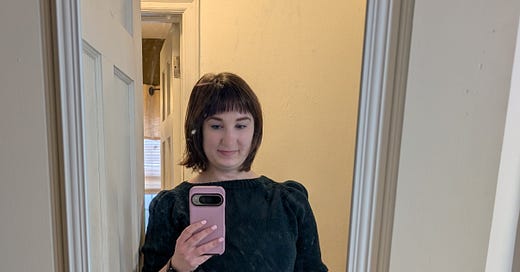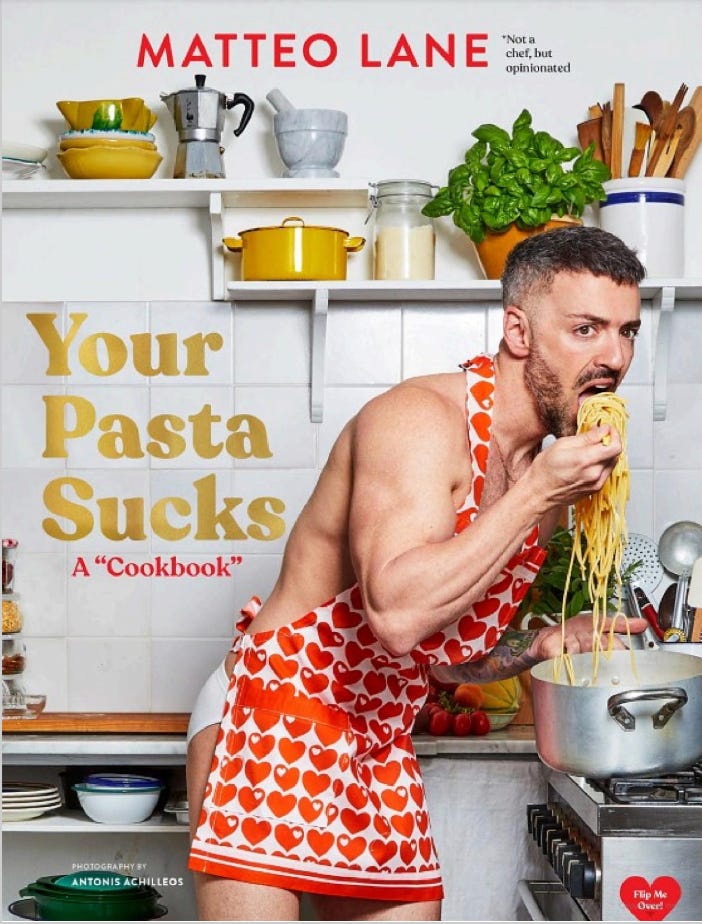The end of April brings with it a huge whoosh of relief as I wrapped up the most grueling semester of grad school to date. In the last four weeks, I’ve written two ten-page papers, speed-read a few hundred pages of theology, and celebrated two of my kids’ birthdays and two family Easters.
I’ve also finished knitting the sweater I started in January (knit almost entirely during Zoom classes!), gotten a tattoo with some friends, and finished planning the Disney trip I spontaneously booked for Mother’s Day with my mom and two of my kids.1

Beyond just having more breathing room, something about the spring weather has rejuvenated my energy. I’ve been organizing and spring cleaning, thrifting enough kids’ clothes to make my grandma proud, and yes, taking more enjoyment of reading as a daily delight rather than just a stack of soon-to-be-overdue library books that must be read.
Your Pasta Sucks by Matteo Lane
Matteo Lane is hands down my favorite comedian. (Reader, do not look him up if you don’t have a healthy tolerance for crude humor.) He shares my Italian-American heritage, so many of his bits about Italian families hit close to home in the absolute best way.
In my years of laughing at Matteo’s jokes, I discovered that he occasionally shares cooking videos on YouTube. They’re produced for laughs, but I actually followed a few of the recipes here and there and found that they’re really good! I’m picky about my pasta, and Matteo Lane delivers. I pre-ordered this cookbook without a second thought.
The book itself is a joy. Every recipe is prefaced with a short, funny anecdote from Matteo’s family. Unlike many cookbooks (or food blogs, let’s be honest) where we all just skip to the recipe, Matteo’s humor makes the blurbs before the recipe worth reading. And the food is excellent! This is high praise coming from someone who makes her own pasta from scratch on occasion, if I do say so myself.
The Unfiltered Enneagram by Elizabeth Orr
I first heard about this book because I follow the author on Instagram, where she posts scathing roasts of each Enneagram type. For those not familiar with the Enneagram, it’s an ancient2 spiritual tool that sorts people into one of nine types. Unlike most personality typing systems, the Enneagram is designed to not only describe why you interact with the world the way you do but to offer a pathway for breaking unhealthy patterns. Though it’s often used in the secular realm these days, it does have a spiritual undercurrent that I don’t think you can fully avoid.
Most of this book was meh for me. The hook that makes it different from other Enneagram books seems to be the irreverent language the author uses to describe each type. Nothing is sugarcoated! But as someone who is already familiar with the tool, that wasn’t enough to make it worthwhile for me—with one big exception.
Orr presents three exercises at the beginning of the book to help you put your Enneagram type into your own words. I followed through with those exercises and discovered that I’ve potentially mistyped myself for nearly ten years?!3 I’m still exploring this further using other resources, but that single discovery probably made reading this one worth it for me as a library book.
A Wizard of Earthsea by Ursula K. Le Guin
This fantasy classic is a coming-of-age story that follows the young wizard Ged through all the hubris and missteps of youthful pride. It’s less about magic than character development (a trait I prefer in my fantasy books) as the heart of the book is about Ged becoming who he’s meant to be. But it’s worth noting that the magic system is fantastic. Le Guin has created a world in which sorcery only works if you know the true, hidden name of the thing you’re hoping to enchant. How cool is that?!
A Wizard of Earthsea feels fresh and innovative—which it was, since this book is from 1968! Le Guin is something of a pioneer in the fantasy genre. Her writing is spectacular, the kind of book where a quote will make you stop reading so you can go write it down somewhere.
Highly recommend, with the caveat that this has a different vibe than most modern fantasy. It’s more “tell” than “show,” as many classics tend to be, but I don’t think that takes away from its beauty.
The Bands of Mourning by Brandon Sanderson
Every month I think I might take a break from Sanderson, and every month my Libby holds say, “Nope!”
The Bands of Mourning is book 3 out of 4 of Mistborn Era 2. If that’s confusing, welcome to Sanderson’s Cosmere. Essentially, Sanderson wanted to take a fantasy world and revisit it every few centuries to show how it had progressed and in what ways the events of previous eras influenced the future of this fantasy land. Mistborn Era 1 takes place a medieval dark ages, and Era 2 has a western/industrial revolution vibe. The final two eras, not yet written, are rumored to be an 80’s-esque dawn of the personal computer, followed by a space odyssey.
I’m loving this era so much more than the original Mistborn trilogy.4 It has a lighter tone, a faster pace, and is wickedly funny. Plus I have a huge soft spot for two of the main characters, one of which has a larger role in this book and who has been confirmed by the author to be on the autism spectrum, which is always cool to see represented in a positive way.
My April reading was still rather paltry, but I can confidently say that May is off to a much better start. How wonderful it is to have some breathing room again! What are you reading this spring? Hit reply or leave a comment!
Don’t worry, I’m not playing favorites. The other two kids have had their own Disney trip. Pro tip for big families who like to travel: sometimes splitting up for trips is the most cost-effective way to make sure everyone experiences the travel that matters to them.
Orr says the Enneagram actually isn’t as ancient as everyone thinks, but I disagree. Though it was first developed in its modern form in the 1950s and fleshed out in the ‘70s, it has roots in the monastic Desert Fathers and Mothers, which Orr overlooks.
I’ve always thought I was a 4, the Romantic. After reading The Unfiltered Enneagram, I’m fairly certain I’m actually a 9, the Peacemaker.
You technically can read Era 2 without Era 1, but I think the magic system and many of the big reveals about new discoveries and religious lore would be lost on you. Was it worth it for me to listen to ~1700 pages of audio to get through the first Mistborn trilogy so I could appreciate the rest of it? Yes, yes it was.








P.S. Can you tell me what age you think Earthsea is for? Like, should I get them on a gift list now for my two, or do I have a few years yet?
OKAY -- we might have to reignite the old Voxer thread to check in on this 4/9 situation.
Also, I love/don't love that we both sent out our newsletters within 24 hours of each other using the word "blur" to describe April. EEK.